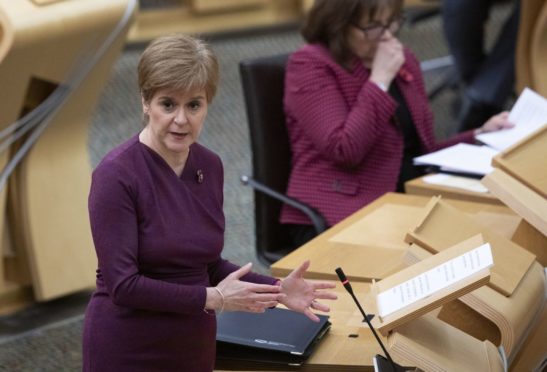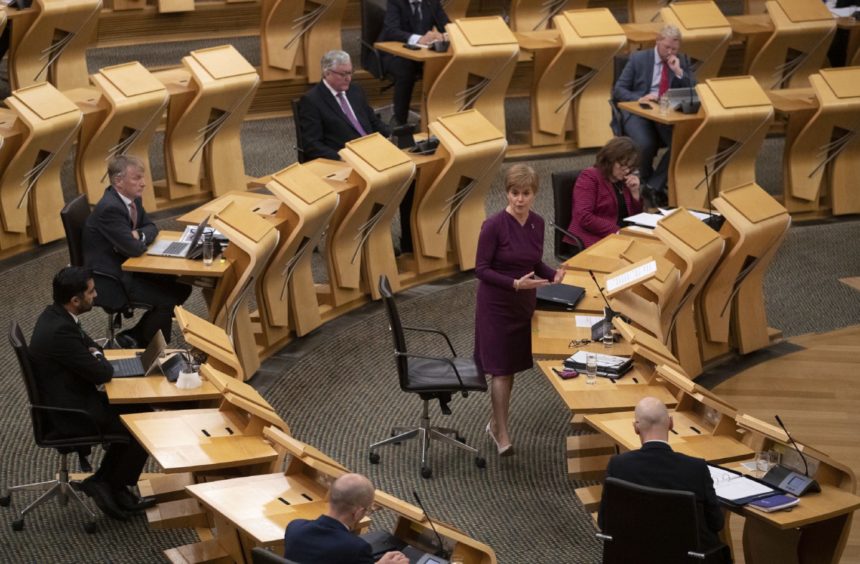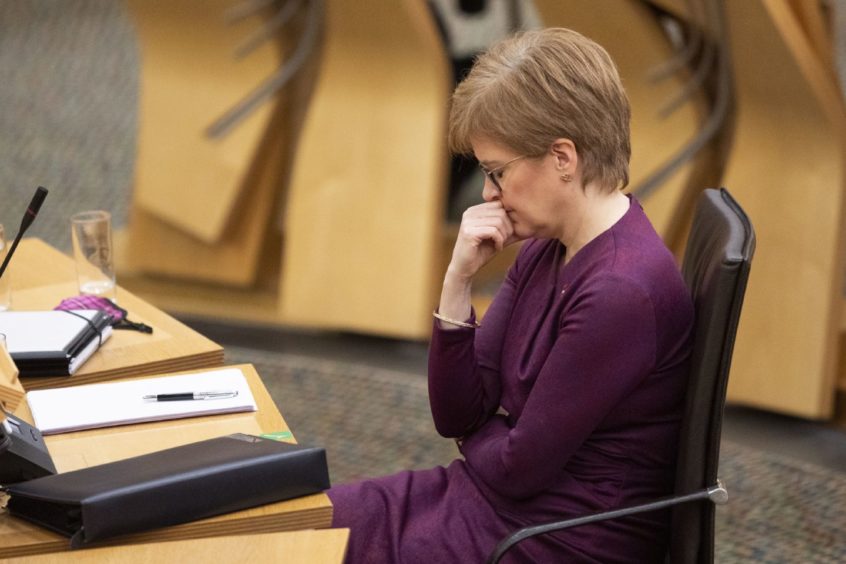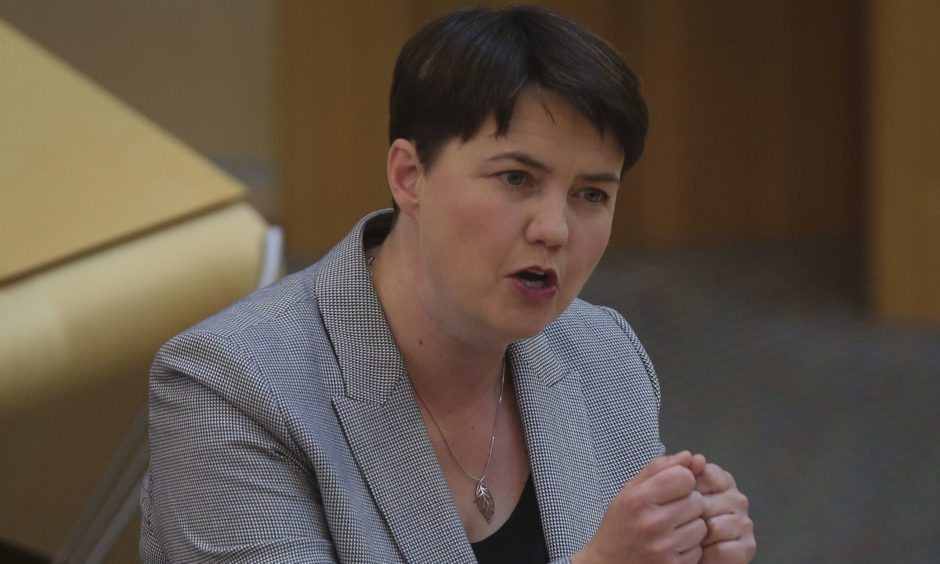Nicola Sturgeon has announced provisional coronavirus alert levels for local authorities across Scotland.
The first minister revealed Dundee could face some of the toughest measures in the country as ministers consider placing it into level three, which would see alcohol sales and non-essential travel to areas with lower restrictions banned.
Six people from two households would still be allowed to meet outdoors, hospitality venues would be allowed to operate until 6pm and accommodation and shopping venues would also remain open.
Ms Sturgeon warned earlier this week that the city was being looked at closely amid growing concern about the rising number of cases in the area.
The Scottish Government’s new five-tier system will run from level zero, which is as close to normal as it is possible to get without better treatment or a vaccine, to level four, which is closer to a full lockdown.
A final decision on levels will not be announced until Thursday but the SNP leader said many local authority areas in Scotland, likely including Aberdeen and Aberdeenshire, will be set at level two – broadly comparable to the current restrictions in place outside the central belt – from November 2.
The Moray, Highland, Orkney, Shetland and Western Isles council areas are expected to be set at level one – just one tier above the lowest possible level of restrictions.
The Scottish Government’s strategic framework, published last week, envisaged six people from two households would be able to socialise indoors under level one restrictions – although this was always subject to change in certain scenarios.
The first minister confirmed new advice from public health officials means prohibition on meeting other households indoors will remain in place under all levels “for a period, as an extra precaution”.
Ms Sturgeon said ministers are considering placing North and South Lanarkshire in level four, the toughest tier of lockdown, while the rest of the central belt would likely be placed at level three – similar to existing restrictions.
Speaking during a debate at the Scottish Parliament on Tuesday, as the country recorded 1,327 new infections and 25 new deaths from coronavirus, she said the benefit of restrictions on household interactions was already being seen.
“The number of new cases is growing more slowly than at the start of the month and we have not seen the nine-day doubling of cases that was predicted earlier this month,” Ms Sturgeon said.
“We hope that the effect of the restrictions on hospitality, which have been in force now for over two weeks, will soon start to be seen as well.
“Our hope is that the rate of increase in new cases will slow even further and we may then see a decline in the number of new cases.
“It is important to bear that in mind as I run through some of the detail of the new levels because it is by reducing our interactions with people – in other households, and in environments with higher risks of transmission – that we will continue to make progress.”
The Scottish Government published an updated draft of guidance on Tuesday on what restrictions will be in place under each of the five tiers applied to local authorities.
In level four, both indoor and outdoor hospitality will close – including cafes, restaurants, pubs and bars. However, takeaways for food and alcohol will be permitted.
The guidance also recommends against non-essential travel in or out of level four areas and says there could be “limits on travel distance or a requirement to stay at home”.
Ms Sturgeon confirmed the Scottish Government will launch a postcode checker so people know which tier of restrictions they live in.
There have also been significant changes to hospitality restrictions, with premises now allowed to sell alcohol indoors with a main meal until 8pm at level two – two hours later than at present.
Under the new hospitality rules – which come into effect on Monday – the definition of cafes will also be removed so all hospitality businesses in level three areas will be able to operate until 6pm, without the sale of alcohol.
The first minister told Holyrood that ministers plan to establish an expert group to examine reintroducing low-level music to venues.
Call for four-nations approach
Scottish Conservative leader Ruth Davidson said her party would vote to support the government’s plans “because the issue is too important to become a political dust-up” but called for measures to protect jobs and a four-nation Christmas loneliness plan.
Ms Davidson insisted that “even if we aren’t able to fill every seat at the family table this Christmas, nobody should have to sit at home alone”.
She added: “A four-nations approach should be pursued to allow, if possible, families to come together to see each other, to love each other and support those who otherwise would be condemned to a very bleak December.”
Ms Sturgeon had earlier in the debate vowed to take on board opposition proposals and “consider them fully”, including the Scottish Conservatives’ suggestion of setting up a new coronavirus business council to help protect jobs.
Scottish Labour leader Richard Leonard demanded compensation be paid to any businesses or workers affected by the new restrictions and called on the government to recognise the “selfless sacrifice” of those hit by additional rules.
Mr Leonard said many working people were now facing the “grim prospect of unemployment and joblessness in the lead up to Christmas”.
Greens say eliminating coronavirus must be goal
MSPs voted in favour of the government’s motion, with amendments from the Scottish Greens and Scottish Liberal Democrats, but rejected alterations put forward by Scottish Labour and the Tories.
The amendment by Scottish Greens health spokeswoman Alison Johnstone noted the ultimate goal must be to eliminate Covid-19, recognised the importance of asymptomatic testing and called for greater sharing of evidence with opposition parties.
Scottish Liberal Democrat leader Willie Rennie’s amendment stated additional capacity is urgently needed in Test and Protect and called on the government to share with communities the criteria and thresholds for moving between restriction levels.




